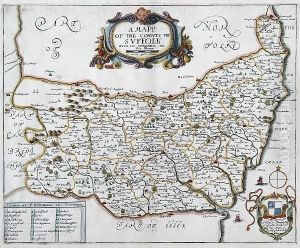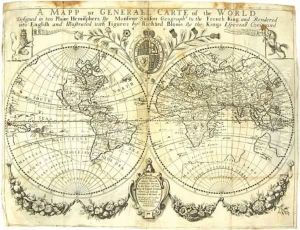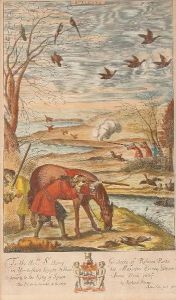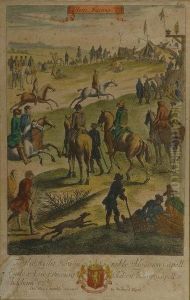Richard Blome Paintings
Richard Blome was an English publisher and cartographer who lived during the 17th century. Born in 1635, Blome was an active figure in the London publishing scene, particularly known for his maps and geographical works. His career spanned a period of significant change in England, including the turmoil of the Civil War, the Commonwealth period under Oliver Cromwell, and the Restoration of the monarchy under Charles II.
Blome's approach to publishing was somewhat controversial for his time. He was known for his aggressive methods of seeking sponsorship and patronage for his works, often dedicating them to wealthy individuals in the hope of securing financial support. This practice, while not entirely uncommon, was considered somewhat unseemly by his contemporaries, and it drew criticism from other publishers and authors.
Despite the criticism, Richard Blome produced several important works. One of his most notable publications was 'The Gentleman's Recreation', which covered topics such as heraldry, horsemanship, hunting, and other country pursuits. Blome's interest in geography led him to produce 'Britannia', which was one of the first comprehensive atlases of the counties of England and Wales. It featured maps that were often based on the work of others, which Blome had re-engraved and claimed as his own, sometimes without acknowledgment. This practice was another source of controversy surrounding his professional reputation.
Richard Blome also made contributions to the mapping and description of territories beyond England. His 'Cosmography and Geography' was an ambitious project that aimed to describe the whole world, and his 'Speed's Maps Epitomiz'd' was a condensed version of John Speed's famous atlas. His work extended to facilitating the translation and publication of foreign works in England, including the French 'Description of the Island of Jamaica' in 1672.
Blome’s career was a testament to the evolving world of print and the growing public interest in geography and travel during the 17th century. He navigated the complex dynamics of patronage and commerce, albeit not without attracting controversy and criticism for his business practices and for the quality and originality of his publications.
Richard Blome died in 1705, leaving behind a legacy of cartographic and publishing contributions that would be valued by historians and collectors in the centuries to follow. His works remain significant as reflections of the state of geographical knowledge and the culture of publishing in Restoration England.




